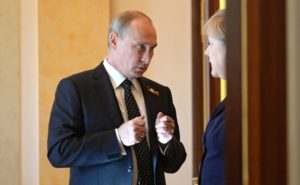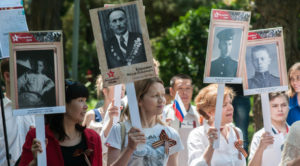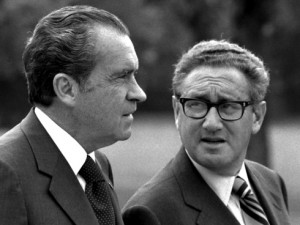
Gilbert Doctorow, Ph.D.
Gilbert Doctorow is the European Coordinator of The American Committee for East West Accord Ltd. and a Senior Research Fellow of the American University in Moscow. His latest book, Does Russia Have a Future? was published in August 2015.
Washington’s political infighting has blocked President Trump’s plans for a new détente with Russia but also has left the global playing field open for Russian – and Chinese – advances in expanding their influence, explains Gilbert Doctorow.
As Democrats and the mainstream U.S. media focus intensely on still unproven charges of Russian election meddling to explain Hillary Clinton’s surprising defeat, the furor has forced an embattled President Trump to retreat from his plans to cooperate with Russia on fighting terrorism and other global challenges.

Russian President Vladimir Putin with German Chancellor Angela Merkel on May 10, 2015, at the Kremlin. (Photo from Russian government)
Amid the anti-Russian hysteria, Trump’s Cabinet members and United Nations ambassador have gone out of their way to reiterate the tough policy positions of the Obama administration with respect to Russia, underlining that nothing has changed. For its part, Congress has plunged into McCarthyistic hearings aimed at Trump supporters who may have met with Russians before the 2016 elections.
Meanwhile, the Kremlin has duly noted these developments in Washington. In Moscow, the breakthrough in relations that some had hoped for is now dismissed as improbable. On the other hand, while the United States is tearing itself apart in partisan fighting, Russia is getting a much-needed breather from the constant ratcheting up of pressure from the West that it experienced over the past three years.
We hear from Russian elites more and more how they plan to proceed on the international stage in the new circumstances. The byword is self-reliance and pursuit of the regional and global policies that have been forming over the past couple of years as the confrontation with the United States escalated.
These policies have nothing to do with some attack on the Baltic States or Poland, the nightmare scenarios pushed by neoconservatives and liberal interventionists in the U.S. and the European Union. The Russian plans also have nothing to do with subversion of elections in France or Germany, the other part of the fevered imaginations of the West.
Instead, the Russians are concentrating on their domestic defense capabilities and their budding political alliances with China and a host of Asian countries that together can oppose the power of the West. It is important to understand that the Russian vision is a future multi-polar world, not a return to the bipolar Cold War system of two superpowers, which Russian elites see as unattainable given the diffusion of power across the globe and Russia’s own more limited resources.
In other words, the Russians are envisioning a future world order whose contours harken back to the Nineteenth Century. In terms of details, the Russians are now inseparably wed to China for reasons of mutual economic and security interest on the global stage. The same is becoming true of their relationship with Iran at the regional level of the Greater Middle East.
The Russian elites also take pride in the emerging military, economic and geopolitical relationships with countries as far removed as Libya, Egypt, Turkey, Pakistan and Thailand. News about breakthroughs with each of these countries is heralded on daily television programming.
Mideast Interests
Russian elites note that the United States has misunderstood Moscow’s position in Syria from the start of the war there. Russia’s priority was never to keep the Assad regime in power, but rather to maintain a foothold in the Middle East. Put narrowly, Russia was determined to maintain its naval base at Tarsus, which is important to support Russia’s presence in the Eastern Mediterranean. More broadly, Moscow’s goal was to restore Russian influence in the strategic region where Russia once was a significant player before the collapse of the Soviet Union in the early 1990s.
Russia’s loss of Eastern Europe is also not forgotten, though American hegemony there is acknowledged as a reality of the present. But nothing lasts forever, and the Russians expect to be back as a major force in the region, not by military conquest, but by virtue of economic and strategic logic, which favors them in the long term. Though many East European elites have been bought off by the United States and the European Union, many common citizens have been major losers from the American led post-Cold War order, suffering from de-industrialization and large-scale emigration to more developed E.U. countries, reaching as much as 25 percent of the general population in some places. These Eastern European countries have little to offer Western Europe except for tourist destinations, whereas their shared potential for trade with Russia is immense.
This past weekend, Russian television news carried images of demonstrations in Poland, Bulgaria, Romania and Moldova that you did not see on Euronews. The object of this popular wrath was billionaire financial speculator George Soros and his "Open Society” affiliates. Russian news commentary explained that these demonstrations — operating under the banner of "Go Home Soros” — became possible now because the Trump administration has dropped U.S. support for him.
It would be naïve not to see some official Russian assistance to these coordinated demonstrations across a large swath of Eastern Europe, but the Russians were simply giving the United States a taste of its own medicine, since U.S.-sponsored "non-governmental organizations” have been busy subverting legitimate Euro-skeptic governments in these countries in cooperation with Soros’s NGOs.
Not Your Grandfather’s Cold War
But there are key differences between what is happening now and in the Cold War days. The original Cold War was characterized not only by military and geopolitical rivalry of the world’s two superpowers, the U.S. and the Soviet Union. It also was an ideological rivalry between – on one side – free market capitalism and parliamentary democracy and – on the other – planned economies and monolithic top-down Communist Party rule.
Starting with President Richard Nixon, a policy of détente was put in place, which embodied the principle of co-existence of these competing principles of organizing human society for the sake of world peace. There are those who maintain we have no New Cold War today because the ideological dimension is lacking, although there are obvious differences over principles between the socially liberal U.S./E.U. and the more socially conservative Russia. But those differences hardly constitute a full-blown ideological conflict.
The real area of contention is in how each side today conceptualizes global governance. On this level, it makes sense to speak of an ideological divide because there is a vast body of thought to underpin the competing views which include: globalization versus sovereign-state; values-based foreign policy versus interests-based foreign policy; a global order established by the all-out victory of liberal democracy over all other forms of national governance versus a balance of forces and respect for local differences; idealism versus realism. The West generally has favored the first of these options while Russia and China lead a bloc of nations generally favoring the second options.
On the campaign trail and in his Inaugural speech, Donald Trump spoke in Realist terms suggesting that the U.S. would abandon its Idealist ideology of the preceding 25 years, which involved coercive "regime change” strategies to impose Western political values and economic systems around the world. Instead, Trump suggested that he would do business with Russia and with the world at large without imposing U.S. solutions, essentially accepting the principles that the Russians have been promoting ever since they began their public pushback to the United States in 2007.
However, given Trump’s retreat on foreign policy in recent weeks – while under fierce attack from Washington power centers asserting possible collusion between the Trump campaign and Russia – we may be left with something akin to the re-set that Obama introduced at the start of his rule in 2009 which never went as far as détente/co-existence. It was limited to cooperation in isolated areas where U.S. and Russian interests were deemed to coincide.
The only difference we might see from the embattled Trump administration is less of a penchant for "regime change” operations and a resumption of some bilateral contacts with Russia that were cut off when Obama decided to penalize Russia for its intervention in Crimea and the Donbass in 2014.
Assuming that Washington’s neocon Republicans and hawkish Democrats don’t push Trump into a desperate political corner, he might at least engage Moscow with a more polite and diplomatic tone. That might be better than some of the alternatives, but it is surely not an onset of a new collaborative Golden Age.
The scaling back in expectations of how far the Trump administration will go in improving relations with Russia makes sense because of another reality that has become clear now that his team of advisers and implementers is filling out, namely that there is no one in his "kitchen cabinet” or in his administration who can guide the neophyte president as he tries to negotiate a new global order and to do a "big deal” with Vladimir Putin, such as Trump may have hoped to strike.
Trump’s son-in-law Jared Kushner lacks the experience and depth to be a world-class strategic thinker. Trump’s Secretary of State Rex Tillerson has corporate skills from his years at Exxon-Mobil but also lacks a strategic vision. Many other key jobs have gone to military generals who may be competent administrators but have limited political or diplomatic experience. There was talk of guidance coming from Henry Kissinger, but he has not been seen or heard from recently, and it is doubtful that at his advanced age and frailty he could provide consistent counsel.
As Trump struggles to survive the cumulative attacks on his fledgling administration, he is also distracted from the reality of a rapidly changing world. If and when he does get to concentrate on the geopolitical situation, he may well have to play catch up with Russia and China as they make deals with other regional players and fill the vacuum left by the ongoing American political disorder.
Assuming Trump can bring on board talented advisers with strategic depth, it would still take enormous vision and diplomatic skills to strike a "big deal” that could begin to end the violent chaos that has swept across much of the world since 2001. If and when that becomes possible, such a deal might look like a "Yalta-2” with a triangular shape involving the U.S., Russia and China.





.jpg/250px-ElbeDay1945_(NARA_ww2-121).jpg)





